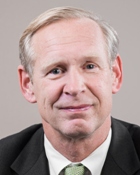In Praise of Telling the Truth – by John S. Kiernan

President’s Column, April 2018
The notion of an unbending personal obligation to tell the truth, as a matter of professionalism and personal character, appears to be an undervalued commodity in public discourse these days. While there will always be ample room for different perspectives on the facts and different choices about what facts deserve more weight, the quality of discourse depends on a shared common commitment of participants to ascertaining the objective truth and presenting no factual statements or characterizations of the facts that are false or purposely misleading.
Outside the realm of politics and public policy, where it’s ultimately necessary to rely on the disinfecting quality of public debate and the ballot box to police commitments to factual accuracy, we lawyers, as spokespeople for clients and as professional advocates, have an important role of our own to play in nurturing and representing a culture of truth-telling. That role includes personal determinations to tell the truth in all professional dealings, relentless communication to younger lawyers of the importance of personal credibility and character to professional and personal quality, and intolerance of any falsehood in the lawyering process.
The starting point for thinking about lawyers’ obligations – and only the starting point – is the ethical requirement of Rule 4.1 of New York’s Rules of Professional Conduct that “[i]n the course of representing a client, a lawyer shall not knowingly make a false statement of material fact to a third person.” That Rule transforms the obligation not to make false statements in the course of practicing law from a matter of personal character to a matter of basic professionalism. The Rule is only a starting point, though, in at least four respects. First, there is no reason why any individual lawyer should limit its application exclusively to “material facts,” as though false statements of immaterial facts are in some sense personally or professionally tolerable. Second, taking into account lawyers’ professional expertise in drawing implications from facts, the proscription should extend beyond false statements of facts to apply equally to misleading statements based on plainly unfair inferences even from facts that are technically true. Third, the Commentary to Rule 4.1 contains the unfortunate statement that “Whether a particular statement should be regarded as one of fact can depend on the circumstances. Under generally accepted conventions in negotiation, certain types of statements ordinarily are not taken as statements of material fact.” While the ethics rules consequently do not prohibit falsity in the context of posturing for negotiations, many lawyers appropriately consider that limitation beneath their dignity and believe with good reason that their personal commitment never to make false statements in any context (including negotiations) is not in any respect incompatible with their determination to advocate zealously and effectively for their clients. Fourth, the proscription against making false statements to any “third person” should plainly include public statements made for consumption by more than any single individual.
Lawyers all know, as other members of the public sometimes have difficulty appreciating, that their personal and professional obligations of truth-telling do not and sometimes cannot equate with obligations of complete candor. The rules of privilege often vest lawyers with knowledge of facts an adversary might find important that the lawyer is simply prohibited from revealing. But the duty not to reveal privileged communications does not ever provide an excuse for making affirmatively false statements. And wise lawyers will be extremely hesitant about presenting factual scenarios that would be undermined by revelation of facts they know but the adversary does not know, recognizing that the revelation of that hidden information could fundamentally undercut the credibility of both their position and themselves as individuals (and that if their success depends on persuading a decision-maker to accept factual scenarios they know are not true, their prospects for achieving ultimate success are profoundly weak).
Courts asked about what characteristics of advocates make them most persuasive and effective uniformly list credibility first. Many judges believe they can discern much more readily than lawyers sometimes appreciate whether the advocate before them is someone who would sooner lose the case and the client than ever knowingly make a false or misleading factual statement to a judge. The same tends to be true for adversaries, and for many jurors. Among the very best advocates and deal lawyers, the overwhelming majority (although not all) are distinctive every time they speak in their obvious reverence for telling the truth.
Lawyers can’t control the public discourse. But public adversarial pronouncements by lawyers have tended to contribute to the image of the profession as willing to treat stubborn fealty to the truth as potentially incompatible with and trumped by zealous service of the client. That need not be so. Even the occasional public necessity of embracing the client’s denial of wrongdoing can be framed in terms that communicate the lawyer’s credibility and determination not to overstate while providing support for the client. A lawyer’s job does not include a responsibility to adopt falsity for the purpose of helping clients. Just the opposite is true and is ultimately most effective for advancing the client’s interests.
While false accusation, false denial and other forms of mendacity are not new to political or other public conversations, or to statements by lawyers, the sense that they are in their ascendancy seems irresistible. Social media provides broad new avenues for lawyers and others to disseminate their views informally, but the absence of formality does not present a reason for less reverence for factual accuracy. Our profession can’t change all public conduct, but it can, and it should, contribute to elevating respect for the duty of people of character to tell the truth, every time they speak.
Besides, as a waggish colleague sometimes used to advise clients, “Another advantage of telling the truth is that it’s easier to remember.”
John S. Kiernan is President of the New York City Bar Association.

